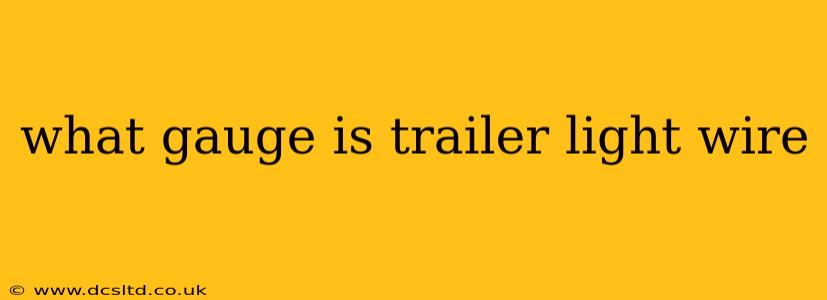What Gauge is Trailer Light Wire? Understanding Wire Gauge for Trailer Lighting
Choosing the right gauge of wire for your trailer lights is crucial for safety and reliability. Using undersized wire can lead to overheating, voltage drop, and ultimately, malfunctioning lights – a serious safety hazard. This guide will help you understand trailer light wire gauge and select the appropriate size for your needs.
Understanding Wire Gauge:
Wire gauge is a standardized measurement of wire diameter. The lower the gauge number, the thicker the wire. Thicker wires can carry more current (amperage) without overheating. Think of it like a water pipe: a larger pipe can handle a greater flow of water.
What Gauge Should You Use?
The appropriate gauge for your trailer light wiring depends on several factors:
-
Total Length of Wiring: Longer runs require thicker wire to minimize voltage drop. Voltage drop occurs when the wire's resistance causes a loss of voltage along the length of the wire, resulting in dimmer lights.
-
Number of Lights: More lights mean more current draw, requiring a thicker wire to handle the increased load.
-
Type of Lights: LED lights generally draw less current than incandescent bulbs, allowing for the use of a thinner gauge wire.
Commonly Used Gauges:
While there isn't one single "correct" gauge, these are commonly used for trailer lighting:
-
12 Gauge: This is a popular choice for shorter runs and smaller trailers with a limited number of lights. It's generally sufficient for most applications.
-
10 Gauge: For longer runs, multiple lights, or larger trailers, 10-gauge wire offers better current-carrying capacity and reduces voltage drop. This is often recommended for added safety and reliability.
-
8 Gauge: For very long runs, numerous lights, or high-power lighting systems (e.g., larger trailers, boats), 8-gauge wire provides excellent current-carrying capacity.
Don't Forget Grounding!
It's equally important to use the appropriate gauge wire for the ground. An undersized ground wire can cause the same problems as an undersized power wire. The ground wire should ideally be the same gauge as the power wire.
What gauge wire is recommended for trailer lights?
The recommended wire gauge often depends on the length of the wire run and the number of lights, but 10-gauge is a good compromise between capacity and flexibility for many trailers. For longer runs or more lights, 8-gauge is often preferred. For shorter runs with fewer lights, 12-gauge may suffice.
What happens if I use the wrong gauge wire for trailer lights?
Using the wrong gauge wire can result in several issues:
- Overheating: Undersized wire can overheat, potentially melting the insulation or even causing a fire.
- Voltage Drop: This results in dimmer lights, which reduces visibility and is a significant safety hazard.
- Malfunctioning Lights: Insufficient current may prevent lights from functioning correctly.
- Increased Resistance: Thin wires have higher resistance, which leads to wasted energy and reduced efficiency.
Can I use different gauge wires for trailer lights?
While you can use different gauge wires for different parts of the circuit (e.g., heavier gauge for the main run and lighter gauge for branches), it's generally recommended to use the same gauge for both positive and negative wires. Inconsistent gauge can create imbalances and potential issues. Consistency provides a safer and more reliable system.
How to choose the right gauge wire for my trailer lights?
To choose the right gauge, consider the total length of your wiring run, the number of lights, and the type of lights (LEDs require less current than incandescent bulbs). A slightly larger gauge than you initially think is needed is often a wise choice to ensure safety and reliable operation. Consult a wiring diagram or seek advice from a qualified electrician if unsure.
This information is for guidance only. Always consult relevant safety regulations and best practices in your region before working with electrical systems. If you're uncertain about any aspect of trailer wiring, it's best to consult a qualified electrician.
